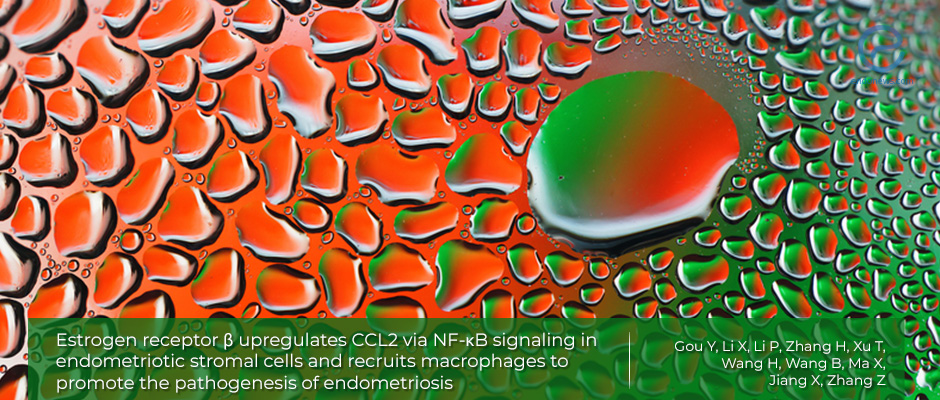A newly found relationship between estrogen signalling and immune dysregulation in endometriosis
Apr 17, 2019
ERβ/CCL2/macrophage axis
Key Points
Highlight:
- Estrogen receptorβ (ER β) recruits macrophages to promote endometriosis.
Importance:
- This study provides a mechanistic understanding of how ER β modulate macrophage infiltration in endometriosis, to provide a better and a new way to limit the progression of endometriosis.
What's done here:
- This is an observational study consisting of 22 women with endometriosis and 14 controls.
- The tissue from ovarian endometrioma and deep infiltrating endometriosis from the 22 women, as well as normal cycling endometrium from the 14 controls, were collected. The stromal cells were isolated.
- Methods used to analyze the tissue and stromal cells include immunohistochemistry, quantitative PCR, Western blot, cell migration assay, and cloning formation assay.
Data:
- High expression of ER β led to the production of CCL2 via the NF-κB signaling and macrophages recruitment.
- Macrophage recruited to endometriosis milieu mainly adopted the activated M2 phenotype.
- Macrophages could, in turn, promote the proliferation and clonogenicity of endometrial stromal cells.
Limitation:
- The endometrioma tissues were collected from women diagnosed with middle to late stage endometriosis.
- This study did not identify how recruited macrophages acquire the M2 phenotype.
Lay Summary
It is believed that endometriosis progression is "at least partly" due to dysregulation of immune cells resulting in the poor clearance of ectopic endometrial debris. In particular, aberrant macrophage function was found to be important in the establishment of endometriosis, since the primary role of macrophage is to engulf cellular debris. Macrophages differentiate into M1 (the classically activated macrophages) or M2 (the alternatively activated macrophages) depending on environmental stimuli. M1 macrophages kill microorganism and have a pro-inflammatory function, while M2 macrophages are often immunosuppressive and have reduced phagocytic ability.
It has been reported that lesions of endometriosis contain higher levels of estradiol than normal endometrial tissues. Estradiol binds to the estrogen receptor and activates estrogen-dependent signaling pathways in endometriotic tissues. There are two classical estrogen receptors (ERs), ERα and ERβ, the expression of the latter recognized to be higher in ectopic endometriotic tissues and drive endometriosis progression. However, it is still unclear whether ERβ can also modulate the immune cells.
This study conducted by Gou et al. from the Department of Obstetrics and Gynecology, Second Affiliated Hospital of Harbin Medical University, China investigated whether ERβ can recruit macrophages to promote the pathogenesis of endometriosis. The study consists of 22 women with endometriosis diagnosed by laparoscopy and confirmed histologically along with 14 controls. The tissues and stromal cells from ovarian endometrioma / deeply infiltrating endometriosis were compared to the normal cycling endometrium control tissue. The article is recently published in "Human Reproduction".
The results show that endometriosis tissues have more M2 macrophages than normal endometrial tissues. ERβ was able to influence macrophage infiltration, through modulation of C-C motif chemokine ligand 2 (CCL2) production to promote their infiltration in endometriosis.
In conclusion, this study demonstrates a crucial link between ERβ and macrophage in mediating endometriosis progression. This newly discovered ERβ/CCL2/macrophage axis may be a potential therapeutic target for the treatment of endometriosis that will need in-depth future testing.
Research Source: https://www.ncbi.nlm.nih.gov/pubmed/30838396
immune system estrogen

